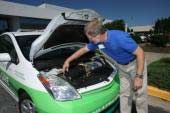TAlan Shedd gets some questions when he parks his Toyota Prius and starts looking for a socket to plug his car in. Especially when people see the green-and-white decal saying the car gets 100 miles per gallon.
Shedd is a mechanical engineer for Jackson Electric Membership Corp., a nonprofit organization that supplies electricity to about 200,000 homes and businesses, including about 100,000 in Gwinnett County.
He drives a customized 2004 Toyota Prius. As part of a national experiment among electric cooperatives, Shedd's company car was modified to allow it to be plugged in when parked.
The modification roughly doubled the car's mileage, Shedd said, but questions remain about cost, practicality and the market before everyone starts driving an electric car to work.
"The advantage of plugging in is it's cheaper," Shedd said.
The Cooperative Research Network, the research arm of the National Rural Electric Cooperative Association, paid to convert four Priuses at electric cooperatives around the county from a hybrid gas-electric engine to plug-in models.
The project is gathering data about how well the modified cars work, partly to see if they can reduce the cost of operating co-op fleets, and partly to see if electric-vehicle charging can add to electric companies' markets.
Shedd drove to Monrovia, Calif., to allow electric vehicle engineering firm EnergyCS Inc. to swap out the Prius' standard batteries for lithium-ion batteries with about 20 times the capacity for usable energy.
A Prius gets pretty good gas mileage as it stands. Toyota says its Prius hybrid gets 50 to 60 miles per gallon, though some Prius owners have found real-world mileage to be a bit lower.
The battery change allows recharging without using the gas engine, saving gallons of fuel each trip. For trips of under 35 miles per hour, the gas engine might not even turn on.
"It's like buying gas at 75 cents a gallon," he said. "It's best suited to an urban or dense suburban environment, like Gwinnett."
The heavy new batteries ate up the car's spare tire space, but there's still some trunk room. And the batteries are relatively expensive — about $20,000, close to the cost of the car itself.
That cost could come down if original equipment manufacturers get into the business, said Pete Nortman, president of EnergyCS Inc.
"Our goal was to do something that was, first of all, safe, and second of all could break the 100-miles-per-gallon barrier on a standard family hybrid car," Nortman said. "Our goal is to try to collect information and to put the vehicles in the hands of people who could do more than just evaluate the technology, but advance it."
The pace of change might look like the Ice Age to the average person, but manufacturers are warming to the idea of plug-in vehicles, Nortman said. Toyota has a small fleet of experimental plug-in Priuses, and other manufacturers are also testing products.
"It's going to be a measured approach," he said. "It's the nascent edge of this market. We're still walking around in animal skins and what we need are tailored suits.”

